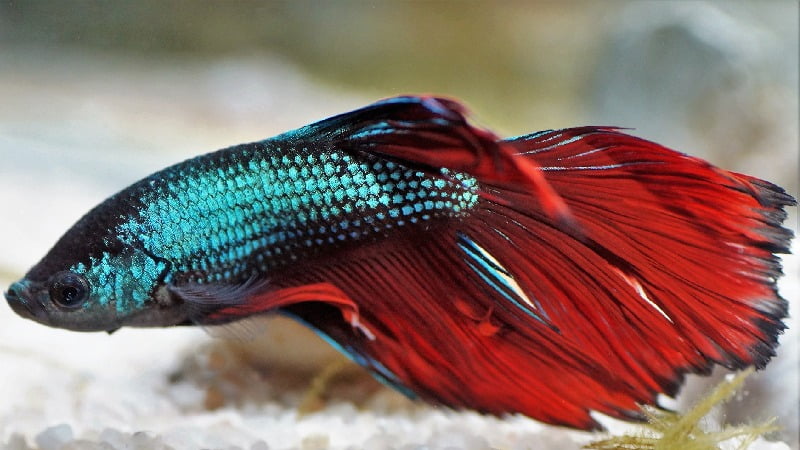Bettas are energetic, flamboyant fish who put on a show at the top, middle, and bottom of the aquarium while you are around. However, your Betta fish may occasionally be seen lying on its side.
What does that imply? That, it turns out, indicates a severe problem. Or topics that are more neutral. Let’s look at some of the most prevalent causes of Betta fish laying on side.
Is It Normal For Betta Fish Laying On Side?
Betta fish are among the most stunning creatures on the planet. They are most beautiful while swimming around your tank and showcasing their attractiveness, with their long flowing fins and vivid color.
What does it imply, though, when a Betta begins to lay near the bottom of your tank? Is this something that happens frequently?
Owners accustomed to seeing their fish act feisty and lively may be alarmed to witness this behavior.
Bettas do this for a variety of reasons, some of which are quite innocent. Others, on the other hand, should be viewed with caution.
This indicates that it is common.
Reasons Why Betta Fish Is Not Moving
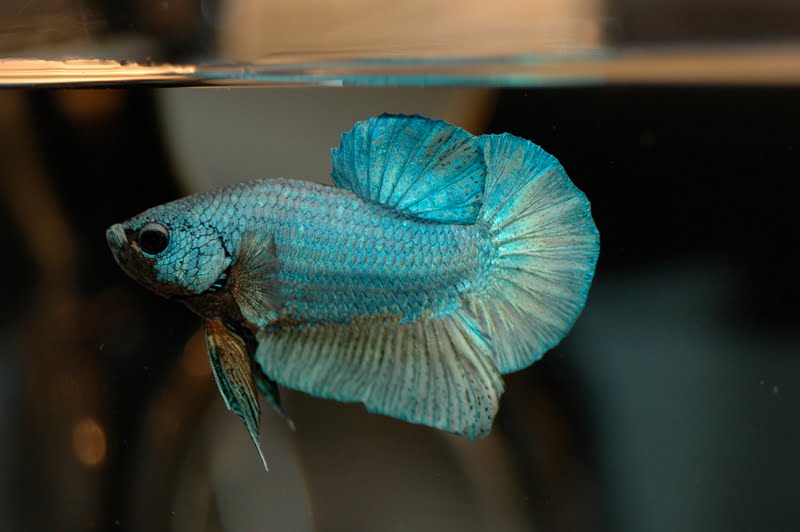
Understanding your Betta fish’s behavior may assist you in determining when action is required. Some of the most common reasons for a Betta fish resting near the bottom of the tank are listed below.
Sleeping Betta Fish
Betta fish, believe it or not, sleep just like any other animal! They actually sleep in the same basic pattern as humans. They prefer to sleep throughout the night and be active during the day.
You might discover them dozing near the bottom of the tank if they don’t get enough sleep at night!
Bettas have a unique reputation for sleeping in unusual places. They can rest on top of plant leaves, cuddle up in nooks, or relax on the substrate.
Consider your evening arrangement if you see your Betta napping a lot throughout the day. Do you keep the lights on in the tank at night? What about the room’s ambient lighting?
Allow your fish to sleep in a dark, calm area at night to ensure they get the rest they require.
Older Bettas Like Resting at the Bottom
Bettas have a short life expectancy. These fish may survive for three to five years in ideal conditions! If you’ve had your Betta for a long time, they may be showing signs of old age.
Like any other animal, Bettas tend to slow down as they age. They don’t have the same energy as when they were younger to zip around their surroundings. Their bodies slow down, struggling to keep up with younger fish.
As a result, most older fish choose to take a little extra time to relax. Your fish may begin to lay down on leaves or spend more time resting on the tank’s bottom substrate.
It’s tough to tell how old your fish are unless you grew them from the fry stage. Even if you’ve only had your Betta for a few months, they could have spent years with a breeder or in a store. If your fish appears to be in good health but is slowing down, they may be nearing the end of their life.
Ammonia Poisoning
Ammonia levels in the aquarium will rise as your fish wastes. Ammonia, as you are undoubtedly aware, is a poisonous toxin for fish. It can cause chemical burns in the gills and eventually death.
The issue with ammonia is that you can’t see it. To keep these levels from soaring, you must rely on regular tank maintenance and monitoring. In other words, frequent water changes and a good filtering system.
Ammonia levels will constantly rise if you do not have an adequate filter. This weakens your Betta fish. Basically, they’re battling to breathe!
Ammonia problems are common in small tanks or overcrowded situations. Check ammonia levels with a testing kit. The only “safe” level is 0 PPM. Any higher, and your fish may suffer.
Nitrate Poisoning
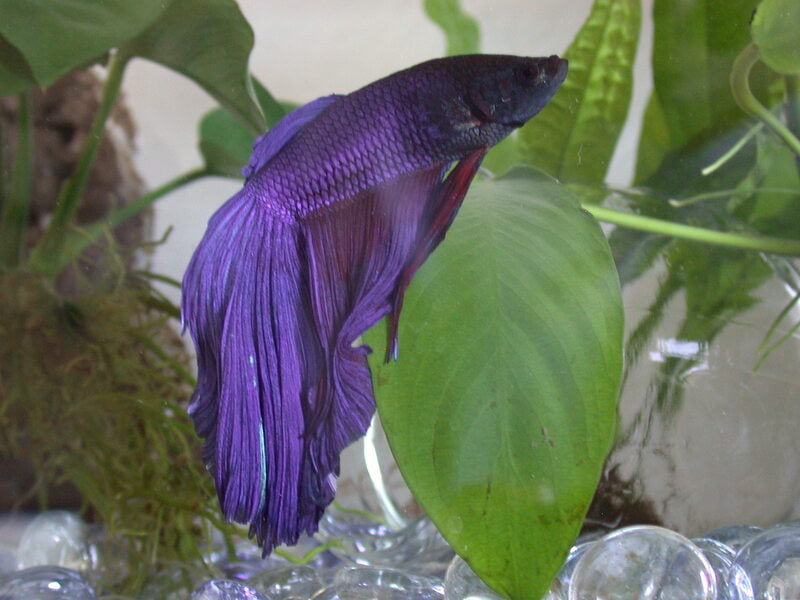
Ammonia is converted to nitrites by bacteria in a well-cycled tank. Afterward, nitrites will be converted into nitrates.
Nitrates, on the other hand, are less toxic than ammonia. They still cause a lot of damage, though. Even worse, nitrate is a poison that takes time to work.
It causes the fish to become drowsy and feeble (and might cause them to lay at the bottom of the tank). Your Betta may lose its appetite and have trouble breathing. You might even notice a change in their hue.
Check the nitrate levels in your water using your water test equipment. You shouldn’t have more than 5 to 10 PPM in your system.
Swim Bladder Disease
Your fish’s swim bladder is an essential organ for swimming. It regulates buoyancy. Swim bladder disease causes a fish to swim in unusual patterns, have trouble moving, or lay at the bottom of the tank.
Bettas have a high prevalence of this condition. These fish have voracious appetites, and as a result, they frequently consume more food than they should. This can lead to constipation and problems with the swim bladder.
You can use High-fiber foods like Daphnia and blanched peas to treat the condition. In the future, limit the food you give to avoid the problem.
Swim bladder illness can be persistent in some cases. Not all fish respond to treatment. You must usually euthanize fish in these situations.
Small Aquarium
Many new fish owners believe that Bettas can live in any environment. True, they may live happily in aquariums as small as three gallons. However, bigger is always preferable!
Your fish will be bored if confined to a small barren area. There isn’t much to discover. Your Betta fish will quickly lose interest in things, leaving them with little choice but to lie at the bottom of the tank.
Allow your Betta fish to have more space to explore. Consider increasing the tank’s capacity by a few gallons. You should also provide your fish with a variety of enrichment materials.
Caves, flora, and natural embellishments are examples of this. All of these factors contribute to your fish’s happiness and health.
Temperature Fluctuation
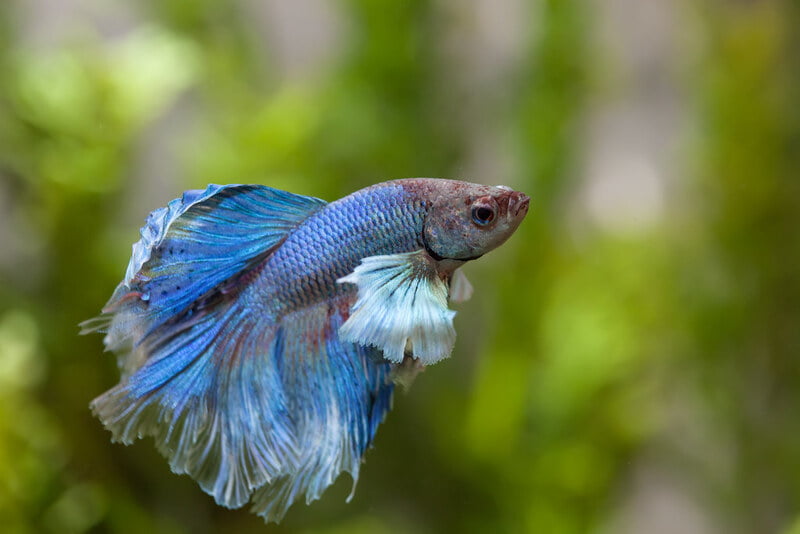
Bettas are vulnerable to temperature shock. These fish prefer warmer temperatures. However, excessive heat throughout the summer can cause various health issues.
On the other hand, Warm seas release oxygen far more quickly than chilly waters. The issue isn’t so much with the temperature. Rather, your fish are suffering from a shortage of oxygen!
Your Betta fish will be panting for breath at the bottom of the tank if there isn’t enough oxygen. Water without a strong supply of oxygen is a severe concern, even if it can breathe atmospheric air.
Slowly lower the temperature of your tank. You may use a fan or a room air conditioner for this. Use an air bladder to inject oxygen into the water swiftly.
Wrong pH
Betta fish may be resting on the side at the bottom of the tank due to low water quality. A typical suspect is an incorrect pH level, among other things.
Bettas do best in water that has a pH of 7.0. Tap water, which has a pH of 6.5 to 7.5, is a wonderful alternative.
Your betta might die in a tank with the improper pH. pH shock is a condition that can affect it. While it has the potential to kill the fish instantaneously, it can also cause it to die slowly. In the latter situation, the fish will show signs of frailty, such as restricted mobility. Before it dies, it may first settle near the bottom of the tank.
Lack Of Filter
If your betta is lying on the edge or bottom of the tank, your aquarium may lack a filter. Toxins and germs that might harm your fish are removed with the correct filter.
Chemicals will build up if you don’t use a filter. As I previously stated, this will result in ammonia and nitrate toxicity. Fin rot and bacterial infection can also be caused by poor water conditions caused by a lack of filter.
However, having a filter is insufficient. Even with a top-notch filtration system, you may occasionally discover a betta fish sitting on the bottom of the tank. Because the filter’s current is too powerful, you may need to change its settings.
Yourtta’s energy will be depleted if the current is too powerful. Consider swimming in a sea with colossal waves. That is something that bettas may also go through. Rather than resisting the water’s motions, they may choose to remain motionless.
One of the easiest ways to reduce the current generated by the filter is to attach a sponge filter. You may also control water flow to your aquarium’s decorations rather than directly hitting your fish.
Improper Eating Habits
A healthy betta fish need a balanced diet. However, keep in mind that too little or too much food might harm their health. Another common reason for a betta fish resting on the tank’s bottom is this.
Bloating occurs when bettas are fed too much food. They, like humans, can’t move around much while they’re full. As a result, they will stop swimming, lay on the bottom, or rest on the tank’s edge.
Feeding the fish too little food, on the other hand, implies they won’t obtain the nutrition they require. Their energy levels decline as a result of a lack of sufficient diet. As a result, their mobility is restricted.
Lack Of Habitat Features
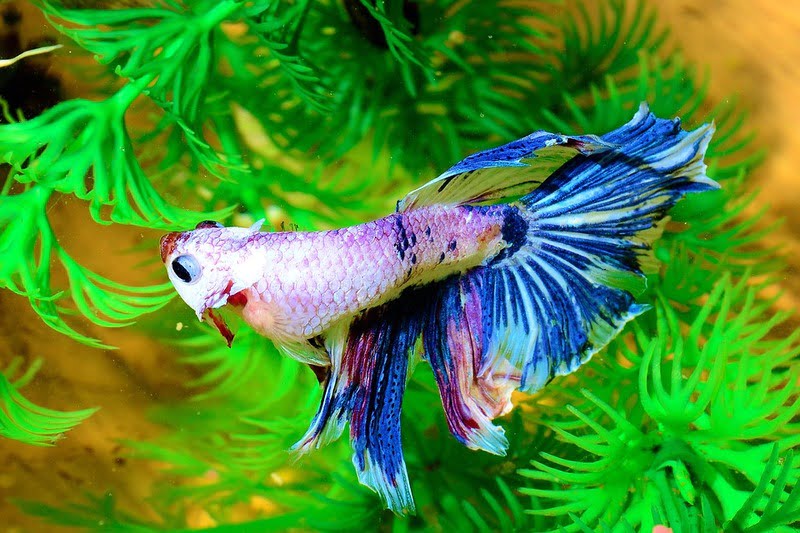
The habitat characteristics of an aquarium are used for more than simply decoration. They play a role in producing a favorable environment for bettas to grow in.
Bettas enjoy having plenty of hiding places, and if there aren’t enough, a betta sitting on the bottom of the tank may become anxious.
You should add more plants to the aquarium and a tiny cave or home construction. Making your betta feel comfortable and secure can help it stay healthy and prevent it from laying on the bottom of the tank.
Wrong Tank Mates
Bettas are also known as Siamese fighting fish or Japanese fighting fish. Its name alone offers you a hint about its aggressive nature. Despite this, it can cohabit with other fish in a tank if you choose carefully.
Larger, more colorful fish should be avoided since they might be daunting to bettas. Nibblers are also prohibited. Bottom feeders are the greatest choice since they have the least influence on bettas.
It’s also not good to have two male betta fish in the same aquarium. Having two men is a sure-fire recipe for catastrophe because they will fight.
While bettas frequently attack and fight when threatened, this is not always the case. They’ll either hide or be heartless. If your betta lives with a more aggressive aquarium fish, it may not move.
Death
The worst-case for a betta not moving. Nobody likes a dying betta fish, yet it will happen.
A betta fish may live for two to four years. It depends on the water quality and temperature. Proper care and upkeep will extend the fish’s life and improve its quality.
The gills are a good place to start looking for a deceased betta. Look for signs of breathing even if it isn’t moving on the tank’s bottom or sides. A deceased betta has the same discoloration.
You may also softly touch the betta aquarium to see whether the fish reacts. A slight movement proves life. Even a sick betta moves when tapped.
Best Practices To Prevent Betta Fish From Not Moving
A betta fish should not be allowed to lay on the edge or bottom of your aquarium. Some of the recommended techniques for keeping it active are listed below:
- Check for symptoms of disease in the fish, such as lethargy or a lack of appetite.
- Clear any problems, such as swim bladder illness, using medicine or other therapies.
- Provide a resting spot for the betta.
- Check for chemical peaks and make sure the water’s chemistry is in order.
- Feed the fish the nutrition they require while avoiding under- or over-feeding.
- Add extra hiding spots or relocate the betta fish to a larger tank to relieve stress.
- Avoid overcrowding the aquarium with ornamentals since this will limit circulation.
- Keep an eye on your betta’s tank mates and stay away from aggressive fish.
- Maintain a temperature of 75 to 80 degrees Fahrenheit in the tank.
Video: Why’s My Betta Fish Not Moving At Bottom of the Tank?
FAQs
What are the differences between a sleeping and dying fish?
A betta fish resting on the bottom of a tank might be asleep or dying. Looking at its appearance is the greatest method to determine the difference. It is most likely dying and not merely sleeping if you notice black patches or other types of discoloration, as well as evidence of trouble breathing or a struggle.
Do betta fish sleep sideways?
Betta fish are known to sleep on their sides. It’s essential to note that if your betta is resting on his side for extended periods, it might indicate something more dangerous. Swim bladder illness, for example, can alter a betta’s buoyancy.
Betta fish laying on the side but not dead. What can I do?
If your fish is floating on the side, not feeding it for three or four days can usually remedy the problem as the fish’s body recovers from the overeating and straightens up.
References
https://home.adelphi.edu/~ve21375/Betta%20Fish%20Care.html

Annette M. Chaney is an experienced marine biologist with over 20 years of experience as an aquarist and fishkeeper. She started her first aquarium at a young age, filling it with frogs and goldfish obtained from the ten-cent pet store.
Annette grew up caring for and breeding African Cichlids, which led to a hobby in high school that doubled as a profitable means. Attending Reed College gave her time to solidify herself as an accomplished aquarium caretaker with an eye for sales. After that, from 2009 – 2013, she studied at Roger Williams University – one of the most prestigious universities for Aquaculture and Aquarium in USA. She is the founder of AquariumCircle since 2010.
